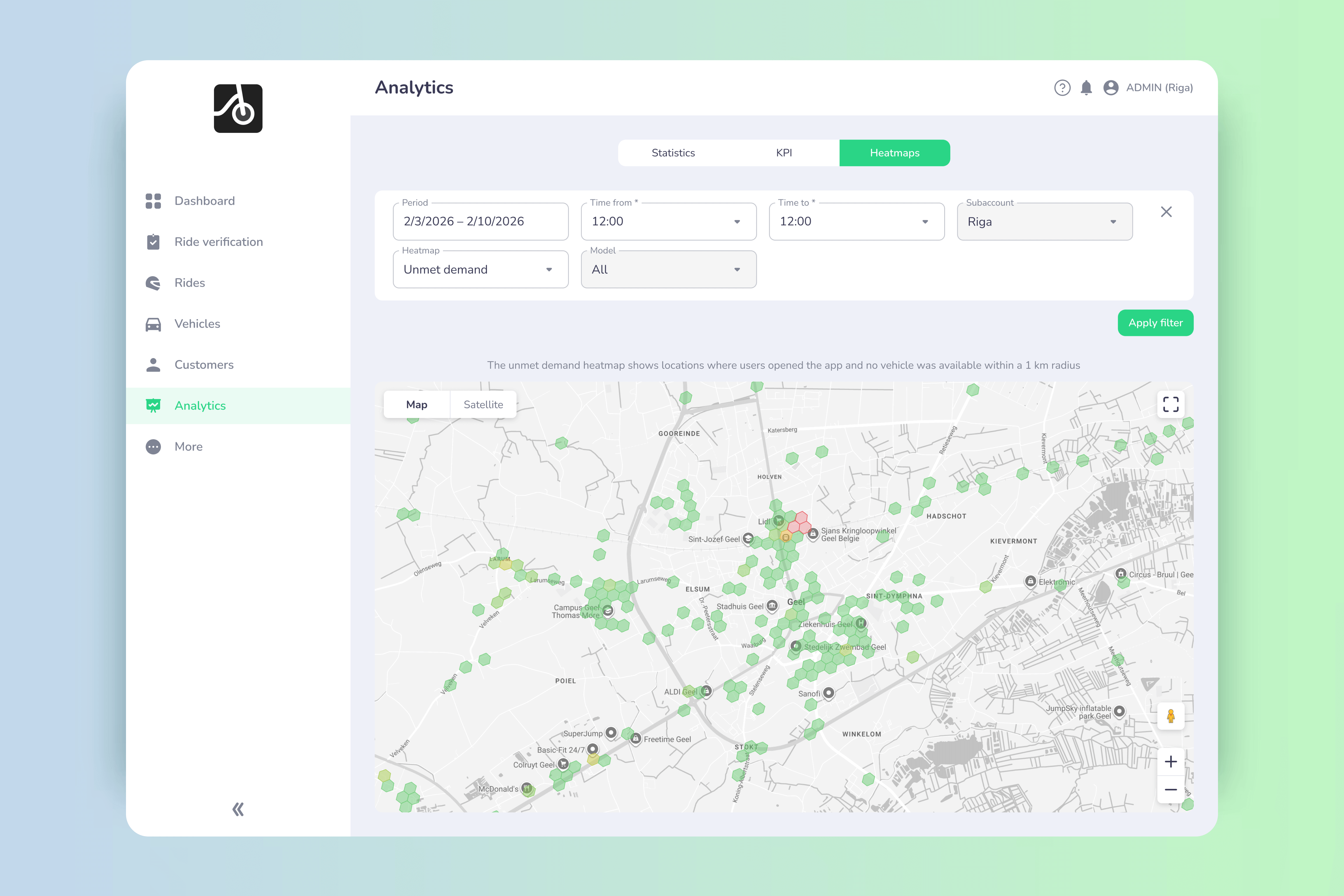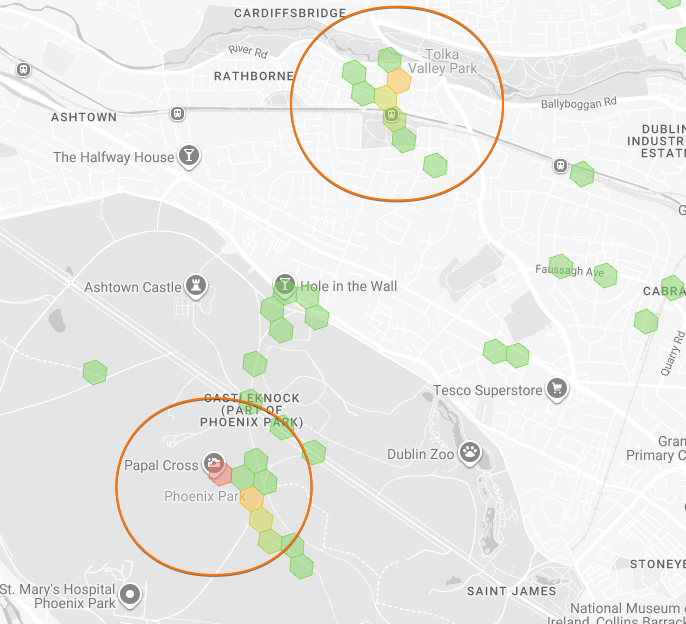
With the increasing demand for shared mobility, we've seen different business models in the car market: traditional car rental, peer-to-peer car sharing, and on-demand car sharing.
In this blog post, we're going to compare these business models. We'll look at the established traditional car rental companies and how they stack up against the newer peer-to-peer and on-demand services. We'll explore how these companies are doing financially – and make some predictions about their possible future.
Traditional car rental
Traditional car rental companies like Hertz, Enterprise, and Avis operate by owning or leasing their own fleets of vehicles. They usually have rental offices and parking lots in strategic locations such as airports and city centers. Customers looking to rent a car make reservations through the company's websites, mobile apps, or by phone. Typically, customers pay a daily or weekly rate, plus additional costs for mileage and optional services like insurance.
Avis – proving that traditional car rental is going strong
Avis was founded in 1946 in Detroit, and it quickly established itself as a major player in the car rental market. Avis is best known for its "We Try Harder" slogan, which was introduced in the 1960s and became a symbol of the company's commitment to customer service. Over the years, Avis has expanded its operations globally.
Avis had a strong second quarter in 2023. They reported $3.1 billion in revenue, with a net income of $436 million. The company saw an increase in usage compared to the same period in 2022, reaching 70.5%. Avis also performed better than expected on Wall Street, with earnings of $11.01 per share – surpassing the estimated $9.79.
At the end of Q2 2023, Avis had around $1.1 billion in liquidity and an additional $1.1 billion for fleet funding. Avis CEO Joe Ferraro credited the strong results to the company's ability to capitalize on the growing travel demand, particularly during the busy summer season.
Hertz – usage and fleet growth
Hertz was founded in 1918 in Chicago. Over the years, Hertz grew into a global brand, serving both the leisure and business travel sectors. Despite various ownership changes, it has maintained a strong presence in the car rental market.
Hertz also reported a healthy second quarter in 2023. They made $2.4 billion in revenue, mainly due to high demand – rental volume increased by 12% compared to the previous year, and their average fleet grew by 9%.
Each vehicle brought in an average of $1,516 per month during the quarter, thanks to a usage rate of 82%, which was 230 basis points higher than in Q2 2022. As of June 30, 2023, Hertz had $1.4 billion in liquidity, with $682 million in unrestricted cash. Overall, Avis' old rivals Hertz are doing quite well too.
Peer-to-peer car sharing
Peer-to-peer car sharing allows private vehicle owners to offer their cars for rent through platforms like Turo and Getaround. The vehicles are distributed across various neighborhoods and residential areas, offering a decentralized and more flexible system. Customers can use these platforms to find and reserve their vehicles of choice.
Turo – promising financials, uncertain IPO plans

Turo, founded in 2009, began as RelayRides and was later rebranded. Turo offers an online platform that allows individual car owners to rent out their vehicles to other people when they are not using them. The company provides a marketplace where people can list their cars for rent, and renters can search for and book vehicles for short-term use.
Turo has gained popularity as a more flexible and often cost-effective alternative to traditional car rental services. It allows car owners to monetize their vehicles when they're not in use and provides renters with a wide selection of cars to choose from.
Turo, valued at $1.2 billion in 2019, has seen promising financials. In 2022, they earned $746.59 million, up 59% from the previous year, with 320,000 vehicle listings. They went from substantial losses in 2019 and 2020 to a net income of $154.66 million in 2022.
Turo also grew its marketplace, engaging with 160,000 active car owners and 2.9 million riders worldwide by the end of 2022. However, according to their S-1 filing, they anticipate increasing expenses in the future, which might challenge their profitability.
Turo applied for an IPO on the Nasdaq in 2022 but didn't proceed. The IPO plans were delayed, likely due to challenges like the 2022 tech downturn. However, recently, Turo revived its plan to go public and could list their shares in the fall of 2023.
Getaround – an uncertain future
Getaround is another popular peer-to-peer car-sharing platform that allows individuals to rent out their personal vehicles to others when they are not using them. It's often referred to as the "Airbnb of cars." Introduced in 2011, it is currently accessible in over 1,000 cities in the United States and Europe.
In 2022, Getaround earned $62.3 million in revenue. However, they reported an EBITDA of -$25.0 million, indicating that its operating expenses exceeded its earnings. Overall, the company experienced a net loss of -$46.8 million for the year. Getaround's total assets were valued at $217.1 million.
During its public market debut in 2022, Getaround witnessed a significant decrease in its share value, plummeting by as much as 65%.
In March 2023, the company got a notice from the New York Stock Exchange saying it didn't meet the requirements. This was because their average global market capitalization over 30 consecutive trading days fell below $50 million, and their reported stockholders' equity was also below $50 million.
Overall, Getaround's stock market troubles and weak finances make their future uncertain for now.

On-demand car sharing
On-demand car sharing services like Zipcar and Share Now (formerly Car2Go) maintain their own fleets, which are parked throughout cities in designated spots or on the streets. Customers can access these vehicles in real-time using mobile apps. The pricing structure usually includes fuel, maintenance, and insurance.
Share Now – downsizing, acquired by Stellantis
Share Now, a German carsharing firm born from the merger of Car2Go and DriveNow, now operates as a subsidiary of Stellantis' Free2Move division, offering car sharing services in European urban areas. It has over four million registered members and a fleet of 14,000+ vehicles across 18 European cities.
In late 2019, ShareNow announced the closure of its North American operations due to competition, increasing operational costs, and limited support for electric vehicles. Service in London, Brussels, and Florence was also discontinued.
On May 3, 2022, Share Now was acquired by Stellantis, with the ownership now managed by Stellantis subsidiary Free2Move, following the closure of the acquisition on July 18, 2022.
CityBee – a success story in Baltics
CityBee, founded in 2012 in Lithuania, started as a car-sharing service primarily aimed at businesses. It now operates in the whole Baltic region. Customers can choose from a variety of vehicles, including cars, vans, bikes, and electric scooters. The fleet also includes electric and hybrid cars. CityBee takes care of insurance, fuel, and parking fees in CityBee areas.
In 2022, CityBee reported a sales revenue of €33,168,028, slightly down from the previous year's €39,814,173. However, the company's profitability surged, with a profit before taxes of €2,193,820 – a substantial increase from the €968,722 in 2021. This also resulted in a higher profit margin of 6.61% in 2022, compared to 2.43% in 2021.
CityBee saw its net profit rise to €1,857,517 in 2022, a substantial increase from the €876,986 in 2021. The company's equity capital also grew to €4,688,176, indicating a stronger financial foundation. CityBee shows that on-demand car sharing can succeed with the right approach in the right market.

There's room for different business models
The shared car mobility market is large enough for different solutions to exist together – especially with car ownership costs going up. Companies like Hertz and Avis demonstrate that the traditional rental model remains relevant and holds significant profit potential.
Despite financial challenges, peer-to-peer car sharing and on-demand car sharing are attracting a fresh customer base. Peer-to-peer car sharing offers a more personal touch by letting people rent their own vehicles. On-demand car-sharing services are a great solution for urban residents, offering quick pay-as-you-go access to vehicles.
While the position of traditional car rental giants might seem unshakeable, it's a fast-moving, evolving market. Regional success stories – such as CityBee – certainly prove that challengers are not asleep.
If you own a fleet, operate a car rental business, or are looking to get into one, ATOM Mobility can equip you with an end-to-end software suite that will put you miles ahead from competition.
Click below to learn more or request a demo.

📉 Every unmet search is lost revenue. The unmet demand heatmap shows where users actively searched for vehicles but none were available - giving operators clear, search-based demand signals to rebalance fleets 🚚, improve conversions 📈, and grow smarter 🧠.
Fleet operators don’t lose revenue because of lack of demand - they lose it because demand appears in the wrong place at the wrong time. That’s exactly the problem the Unmet demand heatmap solves.
This new analytics layer from ATOM Mobility shows where users actively searched for vehicles but couldn’t find any within reach. Not guesses. Not assumptions. Real, proven demand currently left on the table.
What is the unmet demand heatmap?
The unmet demand heatmap highlights locations where:
- A user opened the app
- Actively searched for available vehicles
- No vehicle was found within the defined search radius
In other words: high-intent users who wanted to ride, but couldn’t. Unlike generic “app open” data, unmet demand is recorded only when a real vehicle search happens, making this one of the most actionable datasets for operators.
Why unmet demand is more valuable than app opens
Many analytics tools track where users open the app (ATOM Mobility provides this data too). That’s useful - but incomplete. Unmet demand answers a much stronger question:
Where did users try to ride and failed? That difference matters.
Unmet demand data is:
✅ Intent-driven (search-based, not passive)
✅ Directly tied to lost revenue
✅ Immediately actionable for rebalancing and expansion
✅ Credible for discussions with cities and partners

How it works
Here’s how the logic is implemented under the hood:
1. Search-based trigger. Unmet demand is recorded only when a user performs a vehicle search. No search = no data point.
2. Distance threshold. If no vehicle is available within 1,000 meters, unmet demand is logged.
- The radius can be customized per operator
- Adaptable for dense cities vs. suburban or rural areas
3. Shared + private fleet support. The feature tracks unmet demand for:
- Shared fleets
- Private / restricted fleets (e.g. corporate, residential, campus)
This gives operators a full picture across all use cases.
4. GPS validation. Data is collected only when:
- GPS is enabled
- Location data is successfully received
This ensures accuracy and avoids noise.
Smart data optimization (no inflated demand)
To prevent multiple searches from the same user artificially inflating demand, the system applies intelligent filtering:
- After a location is stored, a 30-minute cooldown is activated
- If the same user searches again within 30 minutes And within 100 meters of the previous location → the record is skipped
- After 30 minutes, a new record is stored - even if the location is unchanged
Result: clean, realistic demand signals, not spammy heatmaps.
Why this matters for operators
📈 Increase revenue
Unmet demand shows exactly where vehicles are missing allowing you to:
- Rebalance fleets faster
- Expand into proven demand zones
- Reduce failed searches and lost rides
🚚 Smarter rebalancing
Instead of guessing where to move vehicles, teams can prioritize:
- High-intent demand hotspots
- Time-based demand patterns
- Areas with repeated unmet searches
🏙 Stronger city conversations
Unmet demand heatmaps are powerful evidence for:
- Permit negotiations
- Zone expansions
- Infrastructure requests
- Data-backed urban planning discussions
📊 Higher conversion rates
Placing vehicles where users actually search improves:
- Search → ride conversion
- User satisfaction
- Retention over time
Built for real operational use
The new unmet demand heatmap is designed to work alongside other analytics layers, including:
- Popular routes heatmap
- Open app heatmap
- Start & end locations heatmap
Operators can also:
- Toggle zone visibility across heatmaps
- Adjust time periods (performance-optimized)
- Combine insights for strategic fleet planning
From missed demand to competitive advantage
Every unmet search is a signal. Every signal is a potential ride. Every ride is revenue. With the unmet demand heatmap, operators stop guessing and start placing vehicles exactly where demand already exists.
👉 If you want to see how unmet demand can unlock growth for your fleet, book a demo with ATOM Mobility and explore how advanced heatmaps turn data into decisions.

🚕 Web-booker is a lightweight ride-hail widget that lets users book rides directly from a website or mobile browser - no app install required. It reduces booking friction, supports hotel and partner demand, and keeps every ride fully synced with the taxi operator’s app and dashboard.
What if ordering a taxi was as easy as booking a room or clicking “Reserve table” on a website?
Meet Web-booker - a lightweight ride-hail booking widget that lets users request a cab directly from a website, without installing or opening the mobile app.
Perfect for hotels, business centers, event venues, airports, and corporate partners.
👉 Live demo: https://app.atommobility.com/taxi-widget
What is Web-booker?
Web-booker is a browser-based ride-hail widget that operators can embed or link to from any website.
The booking happens on the web, but the ride is fully synchronized with the mobile app and operator dashboard.
How it works (simple by design)
No redirects. No app-store friction. No lost users.
- Client places a button or link on their website
- Clicking it opens a new window with the ride-hail widget
- The widget is branded, localized, and connected directly to the operator’s system
- Booking instantly appears in the dashboard and mobile app
Key capabilities operators care about

🎨 Branded & consistent
- Widget color automatically matches the client’s app branding
- Feels like a natural extension of the operator’s ecosystem
- Fully responsive and optimized for mobile browsers, so users can book a ride directly from their phone without installing the app
📱 App growth built in
- QR code and App Store / Google Play links shown directly in the widget
- Smooth upgrade path from web → app
⏱️ Booking flexibility
- Users can request a ride immediately or schedule a ride for a future date and time
- Works the same way across web, mobile browser, and app
- Scheduled bookings are fully synchronized with the operator dashboard and mobile app
🔄 Fully synced ecosystem
- Country code auto-selected based on user location
- Book via web → see the ride in the app (same user credentials)
- Dashboard receives booking data instantly
- Every booking is tagged with Source:
- App
- Web (dashboard bookings)
- Booker (website widget)
- API
🔐 Clean & secure session handling
- User is logged out automatically when leaving the page
- No persistent browser sessions
💵 Payments logic
- New users: cash only
- Existing users: can choose saved payment methods
- If cash is not enabled → clear message prompts booking via the app
This keeps fraud low while preserving conversion.
✅ Default rollout
- Enabled by default for all ride-hail merchants
- No extra setup required
- Operators decide where and how to use it (hotel partners, landing pages, QR posters, etc.)
Why this matters in practice
Web-booker addresses one of the most common friction points in ride-hailing: users who need a ride now but are not willing to download an app first. By allowing bookings directly from a website, operators can capture high-intent demand at the exact moment it occurs - whether that is on a hotel website, an event page, or a partner landing page.
At the same time, Web-booker makes partnerships with hotels and venues significantly easier. Instead of complex integrations or manual ordering flows, partners can simply place a button or link and immediately enable ride ordering for their guests. Importantly, this approach does not block long-term app growth. The booking flow still promotes the mobile app through QR codes and store links, allowing operators to convert web users into app users over time - without forcing the install upfront.
Web-booker is not designed to replace the mobile app. It extends the acquisition funnel by adding a low-friction entry point, while keeping all bookings fully synchronized with the operator’s app and dashboard.
👉 Try the demo
https://app.atommobility.com/taxi-widget
Want to explore a ride-hail or taxi solution for your business - or migrate to a more flexible platform? Visit: https://www.atommobility.com/products/ride-hailing


